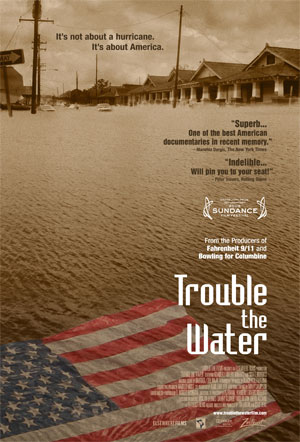 “Trouble the Water†is a documentary that tells the truth about Hurricane Katrina, a truth we never really got to see on the nightly news. What we saw in the media were images of great horror and sadness, with stories that focused on enormous failure and pain. This is a movie about survival and the need to carry on, although that shouldn’t suggest that it merely surrenders to the problem. It focuses on the people of New Orleans who’ve been overlooked and the injustice they’ve had to deal with, people who refuse to be ignored.
“Trouble the Water†is a documentary that tells the truth about Hurricane Katrina, a truth we never really got to see on the nightly news. What we saw in the media were images of great horror and sadness, with stories that focused on enormous failure and pain. This is a movie about survival and the need to carry on, although that shouldn’t suggest that it merely surrenders to the problem. It focuses on the people of New Orleans who’ve been overlooked and the injustice they’ve had to deal with, people who refuse to be ignored.
This is one of the top 10 films of 2008 – it deserved the Academy Award it was nominated for. (The Oscar went to “Man on Wire,†though.) A great deal of the film’s success comes from its approach and style, and it understands that it’s not enough to simply record the facts: A good documentary uses real life to inspire emotions in the audience, using sight and sound to create the connection with a subject on the screen. But “Trouble the Water†is also a film with exceptional control, and although it has to work with a variety of emotions, every moment earns the response that it wants to get.
It helps that one of the documentarians is also one of its subjects. Kimberly Roberts is a rapper from the Dirty South who calls herself Black Kold Madina – she bought a camcorder a couple of days before the hurricane hit. She shot a few interviews with some of the locals as they braced themselves for the storm, but nobody she talked to was especially concerned by the weather reports on TV, and although everyone in the area had been advised to evacuate the city, no transportation was provided for people who didn’t have their own cars.
There was only minor flooding when the hurricane first arrived, but then the levees broke and water ran through the streets in waves. Roberts and her family went into the attic and dialed 911, only to be told that no rescue teams were in their area.
After the storm had eventually ebbed, a neighbor with a boat came to help: He brought them to a rescue station, where they encountered the filmmakers. When they took a look at Roberts’s footage, they changed the focus of their film.
In a way, the aftermath of Hurricane Katrina was as unkind as the storm itself. Roberts and her family got a tip about a Navy base that had a housing unit with beds, but they and lots of other people were turned away by the sailors, who threatened to open fire on them if they didn’t go away. Another outrageous moment is the interview with a travel agent, who says that any mention of the victims is avoided when they sell trips to New Orleans.
Filmmakers Carl Deal and Tia Lessin also worked on “Fahrenheit 9/11,†another electrifying documentary by an emotionally driven filmmaker. Not everybody finds Michael Moore to be their cup of tea, but “Trouble the Water†is a film that will move you regardless of who you vote for. Please see it.

Leave a Reply